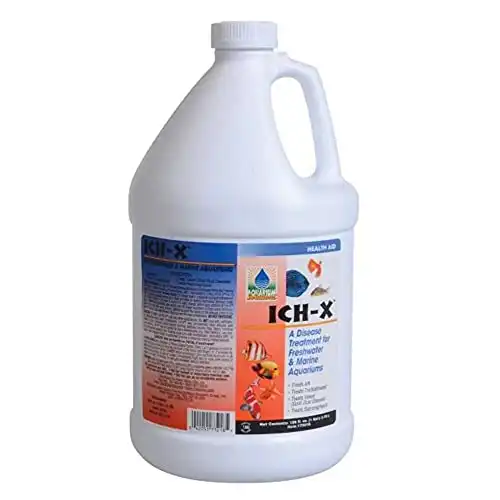Thank you for visiting! By the way… any links on this page that lead to products on Amazon and other stores/partners are affiliate links Aquarium Store Depot earns a commission if you make a purchase.
Are you worried your betta fish might be sick? Well, you’ve come to the right place. This article covers common betta fish diseases, how to prevent them, and what to do if your fish gets sick. So read on to learn everything you need to know about 11 illnesses in betta fish. It might just save a life!
Key Takeaways
- Betta fish are vulnerable to most of the common fish diseases
- Stress from poor water quality management, poor diet, and small aquariums without heating and filtration are common causes of disease
- Treating your betta begins with finding the cause of stress and looking for tell-tale symptoms
- Many betta diseases can be treated at home, but consult a qualified veterinarian if you’re unsure
What Causes Illness?
In many ways, betta fish (AKA Siamese Fighting Fish) are the ideal tropical aquarium fish. These hardy fish are beautiful, interactive, and surprisingly easy to care for. However, betta fish are also susceptible to many health issues, and they can get sick for many different reasons.
Understanding these causes is the best way to prevent problems and give your pet the best chance at a long and healthy life. So why do betta fish get sick? Let’s get into it!
Genetics
Just like people, some fish are prone to certain illnesses because it’s in their ‘family history’. Unfortunately, there’s nothing you can do about this, but buying fish from reputable breeders can lower the risk.
Contamination
Betta fish can be exposed to harmful chemicals and infections when you introduce new decorations, live plants, or infected fish to their tank.
You can minimize the risk by quarantining new fish and live plants and using only aquarium safe decor in your tank.
Stress
This is the big one and probably the #1 killer of aquarium fish. Stressed fish are highly likely to develop illness because it compromises their immune system, leaving them wide open to infections and diseases. Let’s run through a few major causes of stress:
Fighting
Male betta fish are naturally territorial and aggressive, and that’s why you should keep them in their own tank. Fighting causes physical injuries and exhaustion, which are both leading causes of secondary infections.
Water Quality
Most people keep betta fish in pretty small aquariums, where poop and uneaten food quickly build up to cause toxic water. It’s really important to keep your fish in a filtered tank and perform regular water changes, treat your tap water, and maintain a healthy environment for your pet.
Water Temperature & Water parameters
Betta fish are pretty tolerant creatures, but they can only be healthy within a certain range of water parameters. Use an aquarium heater to maintain their water temperature and test your water regularly to make sure they are the ‘safe zone’. Poor water quality will create stress that can get your fish sick.
Safe parameters
- Tank temperature: 76 – 85 °F
- pH: 6.8 – 7.5
- GH: 3 – 4 dGH
- KH: 3 – 5 dKH
- Ammonia: 0 ppm
- Nitrite: 0 ppm
- Nitrate: less than 40 ppm
Diet
Overfeeding and a poor diet are major causes of poor health in betta fish. As a rough guide, feed your fish twice each day and provide a helping of pellets about as big as one of its eyes.
Supplement their diet with live or frozen foods like blood worms once or twice a week to improve their condition.
This frozen food pack contains 4 types of formulas in one package. A great overall package for freshwater fish
Injuries
One of the most common causes of illnesses we see in betta fish is injuries from sharp edges. These fish easily tear their fins on objects like plastic plants and pointed decorations.
Current
Betta fish are adapted to life in the slow lane. These tropical fish live in stillwater environments and they are not known for their speed or agility!
A filtered tank is essential, but it’s just as important to keep the flow low. A strong current will blow your fish around, causing exhaustion, stress, and illness. It’s also possible to have your fish sucked in by the intake. The longer and more ornate your Betta’s fins are, the higher the risk of this happening.
The factors mentioned in this section are responsible for most of the health issues we see in betta fish. Refer back to this list whenever you pick up problems, and go through each one to see if you can identify the root cause.
Warning Signs
Checking in on your fish every day and taking the time to watch and learn about their normal behaviors is the best way to monitor their health. You will have a much better chance of curing your fish when problems are caught early.
If you suspect your betta fish might be sick, or if you just want to know what to look out for, these are the most common warning signs of a sick betta fish:
- Bloated or hollow belly
- Bulging eyes
- Torn, damaged, or split fins
- Floating, sinking, or having trouble swimming
- Dull color
- Decreased activity level
- Clamped fins
- Decreased appetite
- Horizontal stress stripes
- Flashing/scratching against surfaces in the tank
- Gasping and rapid breathing
11 Betta Fish Diseases To Look Out For
So now you know about the major causes of Betta illness and some of the warning signs to watch for, let’s go ahead and learn about some typical diseases you might encounter.
We can separate these common betta fish diseases into four major categories. These are:
- Parasites
- Bacterial infections
- Fungal infections
- General symptoms
Keep in mind that your betta fish may be affected by more than one of these categories at the same time.
For example, a fish with a heavy parasite load will have a weakened immune system and will struggle to fight disease. This leaves them vulnerable to an opportunistic fungal or bacterial infection.
1. Ich
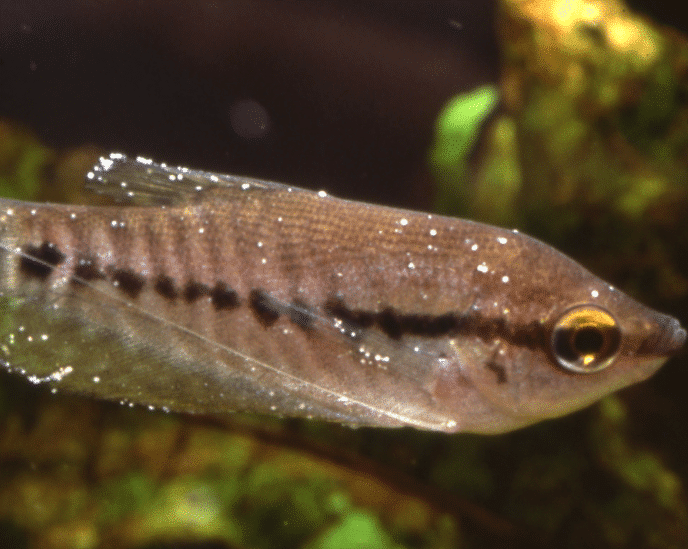
Ich is one of the most common diseases of freshwater fish, and unfortunately, Betta fish are not immune. This parasite (Ichthyophthirius multiliis) causes an illness known as white spot disease, and it can be fatal if left untreated.
Symptoms
The most common symptom of an ich infection are small white spots on the fish’s fins and or body, but sometimes these are only present on the fish’s gills.
Affected fish will often rub their body against the substrate, glass, or ornaments to try to rid themselves of the parasite, but there are some other common signs to look for. They may breathe rapidly, lose their appetite, and hide themselves away.
Treatment Options
- Medications like Ich-X
- Aquarium Salt
- Heat treatments
Ich-X is the best all around medication when it comes to treating Ich
2. Flukes
Flukes are another common parasite that can affect betta fish. Microscopic flatworms such as Gyrodactylus species feed on your fish’s skin and gill tissues, causing discomfort and itching. Unfortunately, serious infestations can be fatal, so this is one disease you definitely want to treat fast.
Symptoms
Flukes are too small to see, but you may notice your fish scratching itself on the gravel or against the rocks and other objects in their tank.
Treatment Options
- Medications like Praziquantel
- Aquarium salt
3. Velvet (AKA Gold Dust Disease)
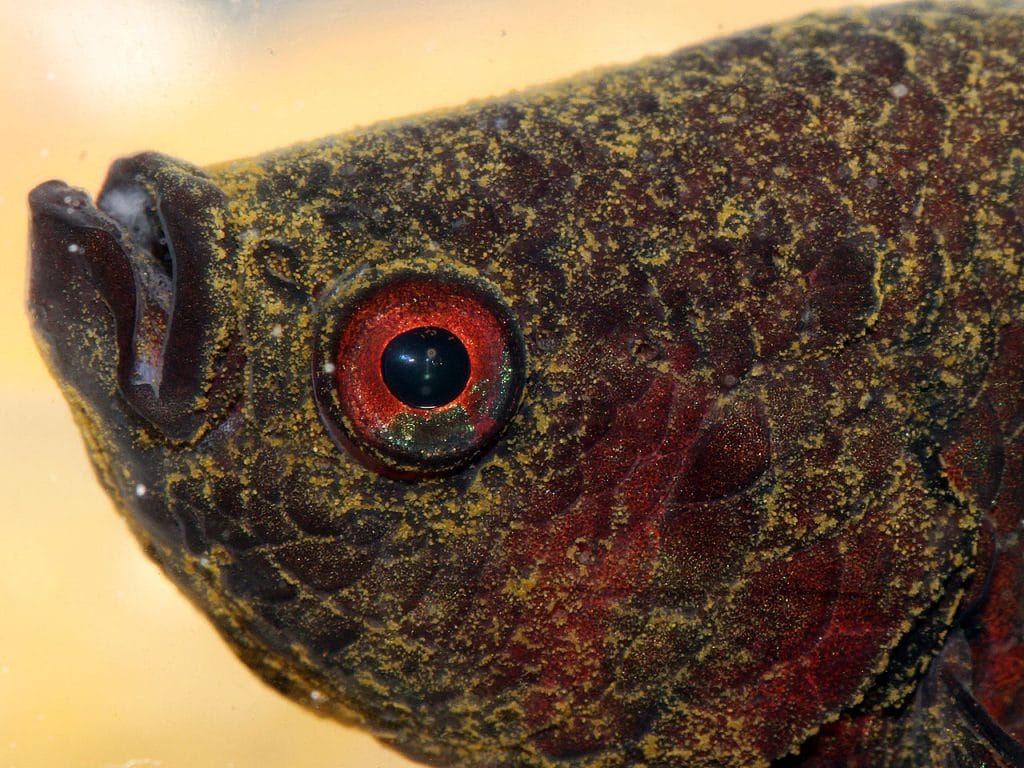
Velvet is another common betta fish disease that is caused by a parasitic protozoan called Piscinoodinium. It is common in Betta fish, and serious cases can be fatal.
Symptoms
The classic sign of this disease is a covering of gold particles all over the betta’s body. Other common signs include missing scales or flashing behavior.
Velvet affects the skin, causing redness and itching. It also damages the fish’s gills, causing rapid breathing.
Treatment Options
- Heat treatments and reduced lighting
- Medications containing copper sulfate
4. Anchor Worms
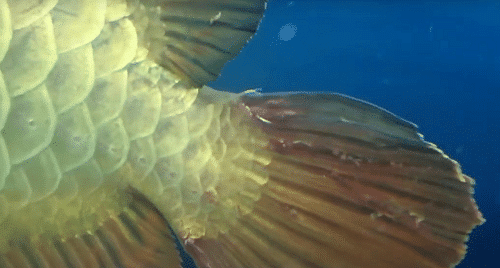
Achor worms are a relatively rare but serious parasite of betta fish. These worm-like crustaceans (Lernaea species) attach themselves to your fish’s skin causing local damage and bleeding.
Symptoms
Anchor worms are large parasites (up to half an inch) that are often visible to the naked eye. They may cause redness and inflammation on your fish or cause your fish to scratch itself against surfaces in the aquarium.
Treatment Options
- Careful removal with tweezers
- Water treatment with Hikari Cyropro or similar products
- Aquarium salt
Fungal Infections
5. Saprolegnia And Other Fungal Infections
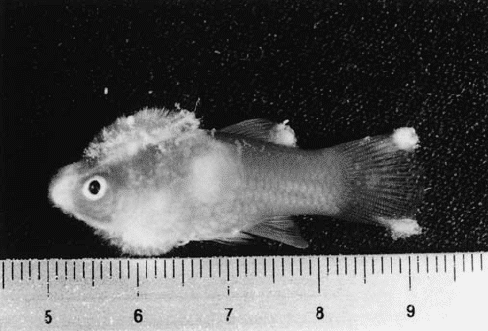
Fungi are common lifeforms in our aquariums, but they rarely affect healthy fish. The problem starts when an injured or stressed fish has a weak immune system and reduced blood flow to a certain part of the body.
Symptoms
A fungal infection can appear as gray cotton-like growths on your betta’s body, gills, or fins.
Treatment Options
- The first step to treating a fungal infection is to find the underlying cause of stress or illness in the affected fish. Test your aquarium water and perform water changes if necessary.
- Next, you can treat the fungus itself by medicating your fish with an antifungal medication like API Fungus Cure or Tetra Fungistop Plus.
6. Fin Rot and Tail Rot
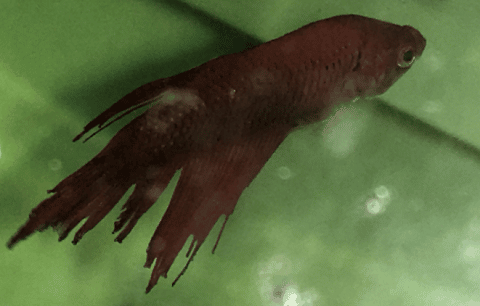
Betta fish fin and tail rot is one of the most common betta fish diseases and often results from a physical injury. Betta fish have especially long and delicate fins that are easily damaged by snagging on sharp decorations and plastic plants.
Fin rot and tail rot are secondary infections that are most likely to occur in poor water quality or in fish with weakened immune systems.
Symptoms
Fish with fin and tail rot will have visible tears, rips, and splits in their fins. Their fins may show discoloration in mild fin rot cases before more advanced symptoms set in.
Treatment Options
- Antibiotics such as Erythromycin are effective against a bacterial infection
- Methylene blue for treatment of fungal infections
- Aquarium salt
7. Mouth Rot/columnaris

Mouth rot or mouth fungus is a bacterial infection that looks very similar to a fungal infection. This condition is caused by the bacteria Flavobacterium columnare and it is also known as columnaris, saddle-back, or cotton-wool disease.
Symptoms
Affected fish develop a fuzzy cottony growth around their lips, whitish patches on their skin, gills and fins, or sores and lesions on their body.
Treatment Options
- Antibiotics
- Aquarium salt treatment
- Aquarium water quality management
General Symptoms
Betta fish suffer from many health conditions where the cause is not clear, or could involve various factors.
8. Swim Bladder Disorder
Swim bladder disease is a symptom rather than a specific medical condition. The swim bladder is a gas-filled organ that fish need to maintain neutral buoyancy in the water so they can stay upright and stable in the water.
Poor health caused by low temperature, overfeeding, or starvation can cause this common problem. Pharmaquatics has a great video above no how he treats the disease. It’s a must watch!
Swim bladder disease is also is a cause of Betta Fish Vertical Death Hang, which is a condition and symptom that can be fatal to your fish.
Symptoms
Betta fish with swim bladder disease have difficulty swimming. They may sink to the bottom, float at the surface on their side, or even swim upside down.
Treatment Options
- Improve aquarium water quality
- Improve diet
- Identify and remove any causes of stress
9. Bloat
Bloat is a common symptom of poor health in betta fish, and it has various possible causes such as overfeeding, constipation, egg-holding, tumors, or bacterial infection.
Symptoms
Betta fish with bloat have a bloated belly. This symptom may show up on one or both sides of the body.
Treatment Options
Treating bloat is difficult because its cause is not easy to isolate. The best course of action for mysterious conditions like bloat is to look for any causes of stress in your fish’s environment.
You may also want to move your betta to a quarantine tank if you are worried about other fish being affected in community tanks. Early bloat can be constipation and may be resolved with epsom salt.
10. Dropsy (Edema)
Dropsy is a serious illness that requires urgent treatment. Unfortunately, this condition could be a symptom of various problems, ranging from poor diet to cancer, so finding a solution can be difficult without professional help. I included a video from EverdayAquatics that goes through how he cured his Betta fish.
Symptoms
This alarming illness causes your fish’s scales to lift, making them look almost like a pineapple or a pinecone. This condition is caused by excess water in your fish’s tissues and it can be a sign of kidney or gill failure.
Treatment Options
It’s best to consult a veterinarian if your fish has dropsy. If you can’t get to a vet you’ll need to try to identify the cause of the problem. Check your aquarium water quality, parameters, and temperature first, and make any necessary adjustments.
11. Popeye

Popeye is an alarming condition that causes your betta fish’s eye to bulge out. This symptom is technically known as exophthalmia. It is often treatable and sometimes clears up on its own, but it can cause the loss of the eye or fatal complications in advanced cases.
Popeye is most often caused by swelling after physical trauma when your fish bumps into something, but it can also result from organ failure resulting from unhealthy tank conditions or bacterial infection.
Symptoms
Popeye is easy to identify. Your fish may have bilateral pop-eye which affects both eyes or just one eye may be affected.
Treatment Options
If just one of your betta fish’s eyes is enlarged, it is quite likely the result of mechanical trauma. The best course of action is to maintain high aquarium water quality and monitor your fish carefully. A bacterial infection may require antibiotics which are available from a veterinarian.
Preventing Illness
Prevention is always better than cure when it comes to caring for your pet beta fish. Here are my 7 top tips to help prevent the common betta fish diseases:
- Set your fish up in a 5-gallon + aquarium with a suitable heater and filter
- Make sure your tank is cycled before buying/adopting your new pet
- Choose a healthy, lively specimen that has been well looked after
- Acclimate your pet slowly to its new home
- Feed your pet a healthy, balanced diet and avoid overfeeding
- Stay on top of weekly aquarium maintenance
- Choose tank mates very carefully and always quarantine them before introducing new fish to your betta tank
Treating Your Pet
As you can see, different betta fish diseases have different treatments, so there is no magic cure for every illness. However, the first two steps are the same in most cases:
- Try to identify the illness
- Identify any sources of stress
Depending on the diagnosis, you may be able to treat the condition yourself using medications from your local pet store, but it’s important to do your homework before treatment. Ask your local fish store for advice and look up a good veterinarian in the area and call in if you’re not sure. It’s best to call before you have an issue.
If you are going to use medications, be sure to follow instructions carefully and consider the health of the other animals in the tank. If you keep other fish, animals, or plants in a community tank, you might need to move your betta to its own hospital tank for treatment.
What is A Hospital/Quarantine Tank?
A quarantine tank is a small aquarium or tub where you can keep new fish for a few weeks before adding them to your main display tank. During this period you can monitor them for signs of illness and parasites to avoid introducing them to your other fish.
You can also use your quarantine tank as a hospital tank for treating sick fish. This is important because many fish medications are harmful to invertebrates and live plants, but it also helps you to separate a sick fish to prevent spreading your betta’s illness.
A small hospital tank also makes feeding and monitoring easier while your fish recovers.
Useful Medications
Let’s take a look at some common medications that you might want to keep for treating common betta fish diseases:
Aquarium Salt
Aquarium salt is helpful for treating many common betta diseases, including bacterial infection, fungal infection, and external parasites like anchor worms. Aquarium salt is not exactly the same as table salt which includes other chemicals like iodine.
Anti-parasitic Medications
A great general medication for various fish diseases. Can be used in water or fed direct with a binder like SeaChem Focus.
- Ich-X
- Seachem Paraguard
- Seachem Metro
- General Cure
- Praziquantel
- Hikari Cyropro
Antibiotics
- Seachem Kanaplex
- API Triple Sulfa
Antifungal Medications
- API Fungus Cure
- Tetra Fungistop Plus
- Seachem SulfaPlex
FAQs
How do I know if my betta fish has a disease?
There are many warning signs to look out for if you think you have a sick betta. Start by looking for physical changes like growths, damaged fins, white spots, or bulging eyes.
Behavioral changes are also important clues. Look for changes in activity levels, difficulty swimming, and a lack of appetite.
What does a sick betta fish look like?
Sick betta fish may have clear physical signs like white spots on their body and fins, damaged fins, or other physical symptoms.
Behavioral changes are often the only obvious sign you’ll see though, and these include flashing (scratching), difficulty swimming and buoyancy issues (floating/sinking), and clamped fins.
Can you heal a sick betta fish?
Sometimes you can heal a sick betta fish by simply identifying the cause of the problem, fixing it, and allowing the fish time to recover. However, fish medications and aquarium salt treatments are required in serious cases.
What could be wrong with my betta fish?
Bettas suffer from many common aquarium fish diseases. These are most often caused by keeping them in small tanks without heating, filtration, and regular maintenance.
How do you help a sick betta fish?
The first step for treating a sick fish is to identify the illness and its cause. Observe your fish’s behavior and look out for any obvious physical problems to help you diagnose the illness before choosing a treatment plan.
What is the best medicine for sick betta fish?
Different betta fish diseases require different treatments, and many problems require no medications at all. Aquarium salt is a good general treatment to have in your first aid kit, but it won’t always work as well as more targeted treatments. Try to identify the cause of your fish’s illness, or get some advice from a professional before medicating a sick betta fish.
How often should I change water for a sick betta?
A regular aquarium water change schedule of 10-20% per week is usually sufficient for a healthy betta, but sick fish may need a more aggressive approach. If you are placing your fish in a quarantine tank, be sure to monitor your ammonia and nitrate levels. Fish in quarantine will usually need water changes sometimes as often as multiple times a week of the tank wasn’t properly cycled.
Make sure to follow your medications instructions on dosaging when changing water
What to do if your betta fish is laying on the bottom?
There are many possible reasons why your betta fish may be lying on the bottom of the tank, and often this is completely normal behavior. Often your fish is just sleeping at the bottom of the tank, but it can be a sign of poisoning, swim-bladder disorder, or other forms of distress. Check out this in-depth article on 12 possible reasons for this behavior to help you get to the bottom of this common concern.
Final Thoughts
Having a sick betta is distressing for any fish owner. However, by identifying the cause of the problem and acting early, fish keepers have a good chance of treating most betta diseases and saving the affected fish.
I hope this article has been helpful to you (and your betta-buddy) and that you will enjoy many more years with your wonderful wet-pet!
- About the Author
- Latest Posts
I’m thrilled that you found Aquarium Store Depot! Here you’ll find information on fish, aquariums, and all things aquatics related. I’m a hobbyist (being doing this since I was 11) and here to help other hobbyists thrive with their aquariums! I adhere to a high quality Editorial Process and Review products with real life field usage and practical analysis.



